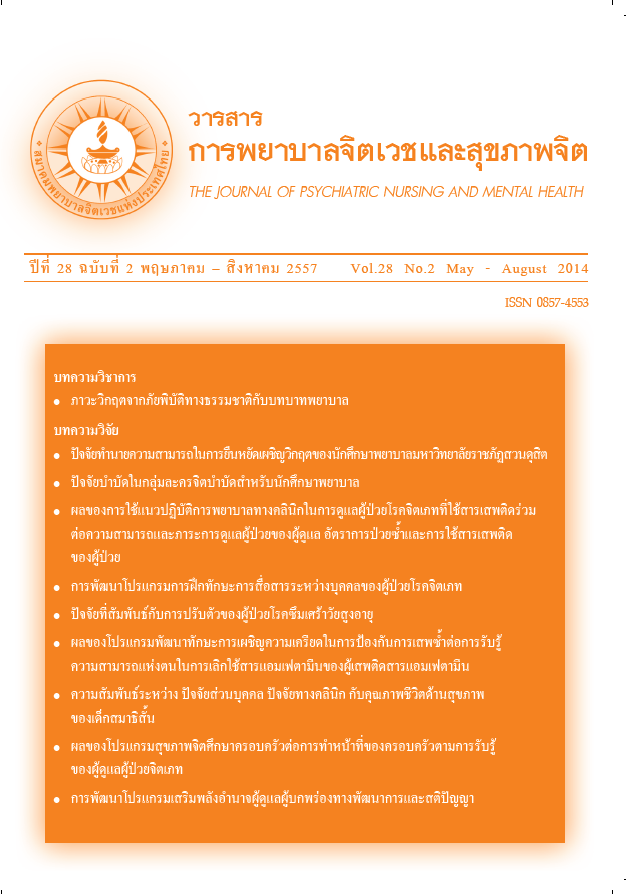ปัจจัยที่สัมพันธ์กับการปรับตัวของผู้ป่วยโรคซึมเศร้าวัยสูงอายุ
Main Article Content
บทคัดย่อ
วัตถุประสงค์: เพื่อศึกษาการปรับตัวของผู้ป่วยโรคซึมเศร้าวัยสูงอายุ และความสัมพันธ์ของ เพศ อายุ สถานภาพสมรส รายได้ ระดับการศึกษา ระยะเวลาการเจ็บป่วย ภาวะซึมเศร้า และการสนับสนุนทางสังคม กับการปรับตัวของผู้ป่วยโรคซึมเศร้าวัยสูงอายุ
วิธีการศึกษา: กลุ่มตัวอย่างคือ ผู้ป่วยโรคซึมเศร้าอายุ 60 ปีขึ้นไป ที่มารับการรักษาแผนกผู้ป่วยนอกโรงพยาบาลเขตภาคตะวันออก จำนวน 165 คน โดยการสุ่มอย่างง่าย เครื่องมือวิจัย คือ แบบสอบถามข้อมูลส่วนบุคคล แบบวัดความเศร้าผู้สูงอายุไทย (TGDS) แบบสอบถามการสนับสนุนทางสังคม (PRQ85 Part II) และแบบสอบถามการปรับตัว (AQ) ค่าความเที่ยงของ TGDS, PRQ85 Part II, and AQ โดยสัมประสิทธิ์แอลฟาของครอนบาค เท่ากับ .83,.86, .85 ตามลำดับ วิเคราะห์ข้อมูลโดยสถิติเชิงพรรณนา สัมประสิทธิ์สหสัมพันธ์ของเพียร์สัน และสถิติไคสแควร์
ผลการศึกษา: ผู้ป่วยโรคซึมเศร้าวัยสูงอายุ มีการปรับตัวในระดับปานกลางคิดเป็น ร้อยละ 75.5. อายุและภาวะซึมเศร้า มีความสัมพันธ์ทางลบกับการปรับตัวอย่างมีนัยสำคัญทางสถิติ ที่ระดับ .01 สถานภาพสมรส ระดับการศึกษา รายได้ การสนับสนุนทางสังคม มีความสัมพันธ์ทางบวกกับการปรับตัวอย่างมีนัยสำคัญทางสถิติ ที่ระดับ .05
สรุป: ผลการศึกษาเป็นข้อมูลในการพัฒนาโปรแกรมที่เกี่ยวข้องกับการสนับสนุนทางสังคมสำหรับการดูแลผู้ป่วยโรคซึมเศร้าวัยสูงอายุให้มีการปรับตัวที่เหมาะสมกับการเจ็บป่วยด้วยโรคซึมเศร้า
Objectives: To examine the adaptation among older persons with depression, and investigate the relationships between sex, age, marital status, income, level of education, duration of the illness, depression, and social support with the adaptation of older personswith depression.
Methods: A correlational research design was used. The 165 subjects, aged 60 years and older, were randomly selected from the out- patient department at the hospital in Eastern area. Research instruments were demographic questionnaires, Thai Geriatric Depression Scale (TGDS), the personal resource questionnaire (PRQ85 Part II), and the adaptation question-naire (AQ). The reliabilities indicated by Cronbach’s alpha coefficients of TGDS, PRQ85 Part II, and AQ were .83, .86, and .85 respectively. Data were analyzed by using descriptivestatistics, Pearson’s product moment correlation coefficient and Chi square.
Results: 75.5% of older persons with depression had the mean score of adaptation at the moderate level. Age and depression were negatively correlated with adaptation at the significant level of .01. Marital status, level of education, income, and social support were positively correlated with adaptation at the significant level of .05.
Conclusion: Findings of this study brought about the essential data to further developing program regarding social support in caring for older persons with depression to properly adjust themselves with their illness.
Article Details
บทความที่ได้รับการตีพิมพ์แล้ว เป็นลิขสิทธิ์ของสมาคมพยาบาลจิตเวชแห่งประเทศไทย


